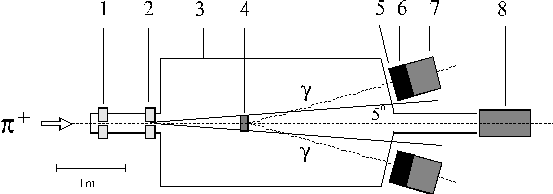







 ,
(3.6)
where N p was the number of beam pions entering the
apparatus, N p b the number of pion beta
decay events, P2 the joint photon conversion probability and
T the effective proper time spent by a pion in the decay region. The
calibration of the energy scale, the conversion efficiency and the absolute
timing of the detectors was done by inserting a CH2 target and using
p - and p + beams which produced
p 0's from reaction (3.3). The conversion
efficiency P2 was found to be 0.5151±0.0062 (1.2%). The
total number of pions N p in the beam was determined by the
counting rates of three different monitors which were averaged; the final value
was N p = (2.144±0.0218)·1019 (1.01%).
The quantity T, i.e. the acceptance for the 2 photons to hit the
detectors was calculated by a Monte Carlo program. The final value was
T=(3.534±0.031)·10-11s (0.9%), where the error
primarily was from the statistics of the Monte Carlo simulation.
,
(3.6)
where N p was the number of beam pions entering the
apparatus, N p b the number of pion beta
decay events, P2 the joint photon conversion probability and
T the effective proper time spent by a pion in the decay region. The
calibration of the energy scale, the conversion efficiency and the absolute
timing of the detectors was done by inserting a CH2 target and using
p - and p + beams which produced
p 0's from reaction (3.3). The conversion
efficiency P2 was found to be 0.5151±0.0062 (1.2%). The
total number of pions N p in the beam was determined by the
counting rates of three different monitors which were averaged; the final value
was N p = (2.144±0.0218)·1019 (1.01%).
The quantity T, i.e. the acceptance for the 2 photons to hit the
detectors was calculated by a Monte Carlo program. The final value was
T=(3.534±0.031)·10-11s (0.9%), where the error
primarily was from the statistics of the Monte Carlo simulation.
From the total of 667000 recorded events,
N p b =1223±36.2 events were identified as pion
beta events (error 2.9%). Together with the systematic uncertainties the
numbers above inserted in equation (3.6) lead to a branching ratio
 . (3.7)
This value is the best experimental determination of the pion beta decay rate
so far.
. (3.7)
This value is the best experimental determination of the pion beta decay rate
so far.





